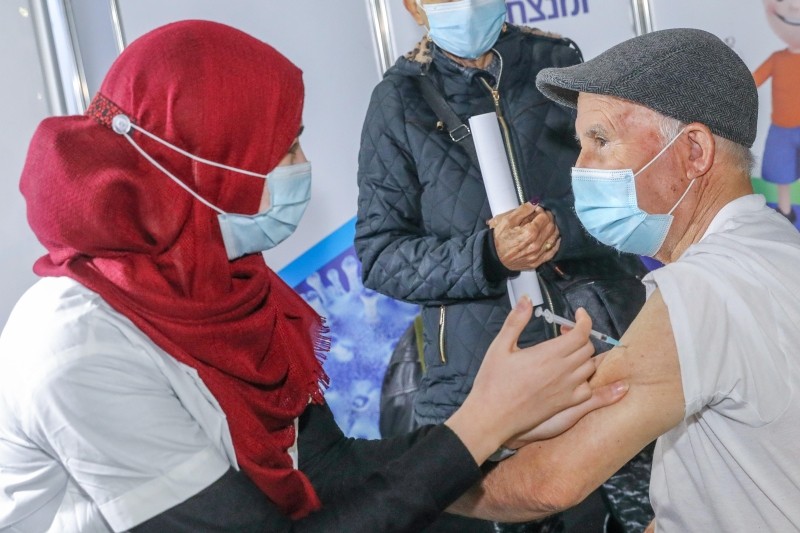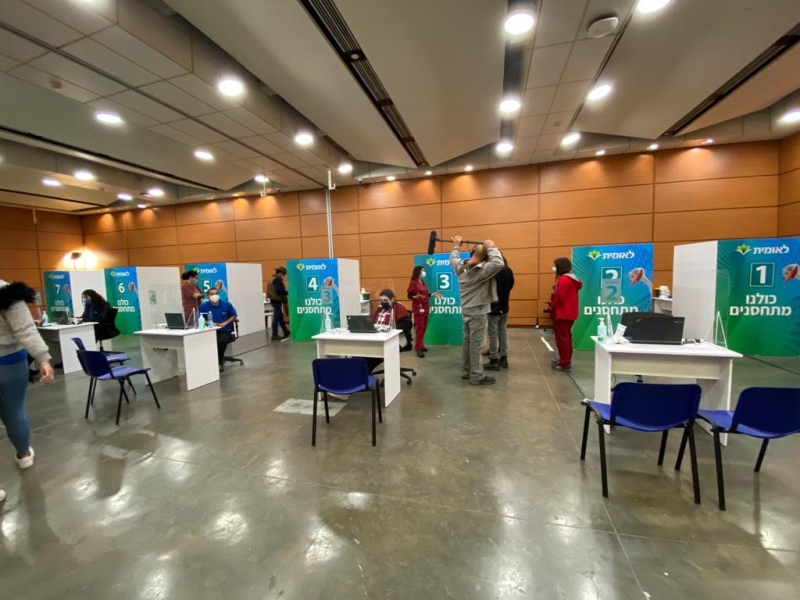An Israeli senior citizen looks intensely at the nurse as he is injected with the Pfizer COVID-19 vaccine at the Jerusalem Pais Arena, Kupat Holim Clalit. (Photographer: Marc Israel Sellem)

Why Israel's COVID-19 vaccination rollout programme is rated the most successful globally, and what lessons can be drawn from its experience?
Neichü Mayer
Kibbutz En Hashofed, Israel
Israel began inoculating its citizens against Covid19 within a week of the arrival of the first shipment of the Pfizer vaccine from the US on 17 December 2020. Since then, nearly 2 million citizens have received their first dose of the vaccine. Health care providers, frontline workers, people with underlying health conditions, and 60 years and above citizens were given first priority, followed by teachers, police, fire servicemen and women, public service workers, and people working in food and essential commodities services. Beginning from early January 2021, citizens over 50 years of age are being inoculated. The rest of the population has been informed that they too can get vaccinated within the next one to two months. The country has also decided that children from age 12 onwards will be included in the vaccination drive. If the remaining expected shipments from Pfizer and Moderna (and Britain's AstraZeneca) arrive as planned, Israel would have inoculated 90 percent of its population against Covid19 by April 2021, if not sooner. This put Israel far ahead in its vaccination drive than any nation in the world.
Both Pfizer and Moderna, the two leading internationally approved vaccine producers signed agreements with Israel at the early stage of the vaccine development. Besides the fact that Israel was willing to pay more to be in the priority list of the global vaccine distribution plan, both the companies are keen on piloting their vaccine rollout programme in Israel because of the existence of high tech, fully digitalized health systems management that will give them high value data, which is critically needed to measure the efficacy and eventual success of the vaccine in disabling the spread of Coronavirus in the world.

Vaccination center of Kupat Holim, Leumit. It is one of the four health management organizations (HMOs) in Tel Aviv, Israel. (Photographer: Rogel Rahman)
Although the country is presently under the third lockdown due to high infection rate, which is fueled by the arrival of the new strain of the virus, there is hope that when the large majority of the population is inoculated, the immunity level in the country will rise drastically. This is still speculation. However, there are encouraging data showing over a 50% drop in infection rate amongst those administered with the 1st dose, and this is expected to reach 95% one week after the 2nd dose.
As the whole world awaits the 'best-on-the-ground-data' about the vaccines' efficacy from the world's leading vaccination nation, Israel, there is also a high risk of complacency. The country’s Ministry of Health is continuously cautioning that safety measures such as masks, social distancing and hygiene are still essential and must be strictly maintained.
How Israel became the international experiment for a fast, effective and efficient Covid19 vaccine rollout programme is a fascinating saga in itself. A huge portion of the credit for the success of Israel's health system, which is fully equipped and geared to launch such a massive vaccination drive, goes back to the country's pioneers who set up the system years before the country was established.
The story of Israel's Health Services Systems began in 1911 with 150 Zionist-immigrant workers who came together to form a mutual aid health care association. These pioneers came to work on the land owned by Jewish philanthropist Barron Edmond James de Rothschild. They faced dangerously neglected, swamp-infested land lacking water and other vital resources. They knew that to help themselves, they had to help each other survive the dangerous health condition they face. With this in mind, they voluntarily set aside a portion of their wages, according to income, for the medical treatment of the sick. And that is how the first of the present four Healthcare Maintenance Organisations (HMOs) came into being. When the country was established in 1948, this existing Community Medical Service was called in to help create what is today the most inclusive patient-centered personal health care system, also known as the health fund.
The universal health care coverage that Israel offers to all its citizens and residents has proved to be the landmark for a fast and effective response to a global pandemic of such a magnitude. All Israelis are entitled to healthcare as a fundamental right, and membership in at least one of the medical insurance plan is mandatory. And hence, everyone is required to register under one of the four the HMOs. While all of the four HMOs charge similar fees according to the age of the person insured, they operate as a not for profit organization and are legally prohibited from denying membership or services to any Israeli citizen. Backed by public hospitals and the health ministry's relentless leadership in securing the vaccines, the HMOs have mobilized every available resource to support the Covid19 vaccination campaign, including setting up drive-in vaccination centers in public spaces all over the country—retired doctors, nurses, emergency medical aid workers - all stepping forward to volunteer in these facilities. For most peoplethe process has been swift and smooth, with less than 30 minutes from the time of arrival at the facility to the moment when the needle is inserted into their arm.
Many countries in the world not only do not have universal health coverage for its citizens but also lacks the infrastructure to procure and manage logistics of such a magnitude.
The logistics unit of Israel's Teva Pharmaceutical Company called SLE is handling the vaccines in an underground facility near the main airport that can hold 5 million doses in thirty large freezers set at minus 70 degrees Celsius. SLE repackages them into small pizza sizes in bundles as little as 100 doses to be delivered to about 400 vaccine centers, allowing easier access to small clinics as well as to large centralized centers. Once the vaccine is out of the freezer, they need to be used up or, if not, be destroyed. Hence detailed planning of how much capacity per day and ensuring that every shot is utilized and not wasted requires extensive communication and mobilization campaigns. Some nurses have been out on the street near vaccine centers at the end of the day calling out on a pizza delivery guy or workers on the street, asking if they would like to come in and get a shot. Such is the spirit that drives this country.
Magen David Adom, Israel's red cross that provides a 24hour national emergency response service is tasked with the responsibility of vaccinating the residents and employees of elderly care centers, nursing homes and assisted living centers across the country. They have been at the forefront since the outbreak of the pandemic.
It will be an illusion to think that there have been no hurdles along the way. Before the vaccines arrived, a survey showed that only 40% of Israelis were willing to take the vaccine. Today, survey shows huge demand and high satisfaction rate. Although there has been no massive media campaign, a concerted effort of all key stakeholders, including religious leaders and health experts, to communicate clearly and decisively using evidence-based science played a significant role in securing public trust. The President, Prime Minister, Health Minister, Knesset (Parliament) members, leading scientists and social influencers took the vaccine in the public eye and spoke with convictions of the need to have the vaccine. A renowned rabbi even went on to share a prayer of gratitude he wrote on receiving the vaccine.
Two minority communities in Israel were a major challenge in curbing the virus's spread and rolling out of vaccines in their communities – the Ultra-Orthodox Jewish community and the Arab Israeli community. Both have a large young population that is not taking the virus seriously and amongst who fake news about vaccines tend to spread more. Culturally appropriate and targeted information communication through using platforms of local authorities and social influencers has made encouraging breakthroughs so far.
Credit also must be given to the fact that Israel’s primary heath care focus is Preventive Approach, and hence receiving inoculations is a familiar thing and its acceptance level is quite high amongst the general population.
One primary reason why and how Israel was able to implement the vaccine rollout so fast and effectively in such a short period is that Israel is always ready for emergencies. The country is equipped for any untoward circumstances, especially war or natural disasters. People of the country are generally willing to go to any length and sacrifice to protect and defend their own. In just 70 years of its existence, the infrastructure investments in this country are already to the level of most of the developed countries in the world. And most importantly, Israel puts a huge emphasis on science and technology development, which is why it is rightly referred to by many as a Start-Up Nation.
As mentioned earlier,Israel is the ideal arena for the global experiment of vaccine rollout because of the amazing digitalized health system covering every citizen of the country with a health care package called, 'From Cradle to Grave'. Besides this fact, I suspect that the reason why Pfizer and Moderna were both so willing to ship their vaccines to Israel right away when it was approved is because of the connection between Israel and the leading figures in the vaccine development. The CEO of Pfizer, Albert Bourla is the son of Holocaust survivors from Thesoleniki, Greece, whose family is part of a small remnant of Jews left in Greece today. The main public face of Moderna, Chief Medical Officer, Dr. Tal Zaks, is an Israeli, born, raised and educated in Israel. He said that he had his 80 years old mother in Israel in his mind when he made a commitment to go to any length to find the vaccine. It is also believed that the Jewish philosophy or concept of 'Gemiluthasadim', which literally means giving loving-kindness – providing for the sick, the elderly and the poor has a part to play in Israel's successful health programme.
There is much for the world to learn from Israel's Covid19 vaccine rollout experience. With the right infrastructure and resources in place, effective digitalization systems, tracking and communication mechanisms, sufficient supplies and effective distribution of vaccines and most importantly having a public support may finally get the world to contain this unprecedented pandemic, and be better prepared for such crisis in future.
Israel is calling the Covid19 vaccine drive, ‘Operation Getting Back to Life”. The first lockdown due to the spread of the virus last year was during the week of Passover, the most important Jewish holidays. Many people are still traumatized from the fact that they were unable to be together with their loved ones during the Passover Seder dinner where every Jewish family recounts the exodus of the Jewish people from slavery to freedom. This massive vaccine campaign hopes that “with the extraordinary efforts, on this year’s Passover Seder night grandparents, parents, children, and grandchildren will be able to gather together around the table once again. And when we ask the traditional question of why this night is different from all other nights, we will be able to answer: “Everything has changed; tonight we are all reclining”.
(The writer has background in Global Health Advocacy and Health Systems Strengthening interventions in low income countries)






